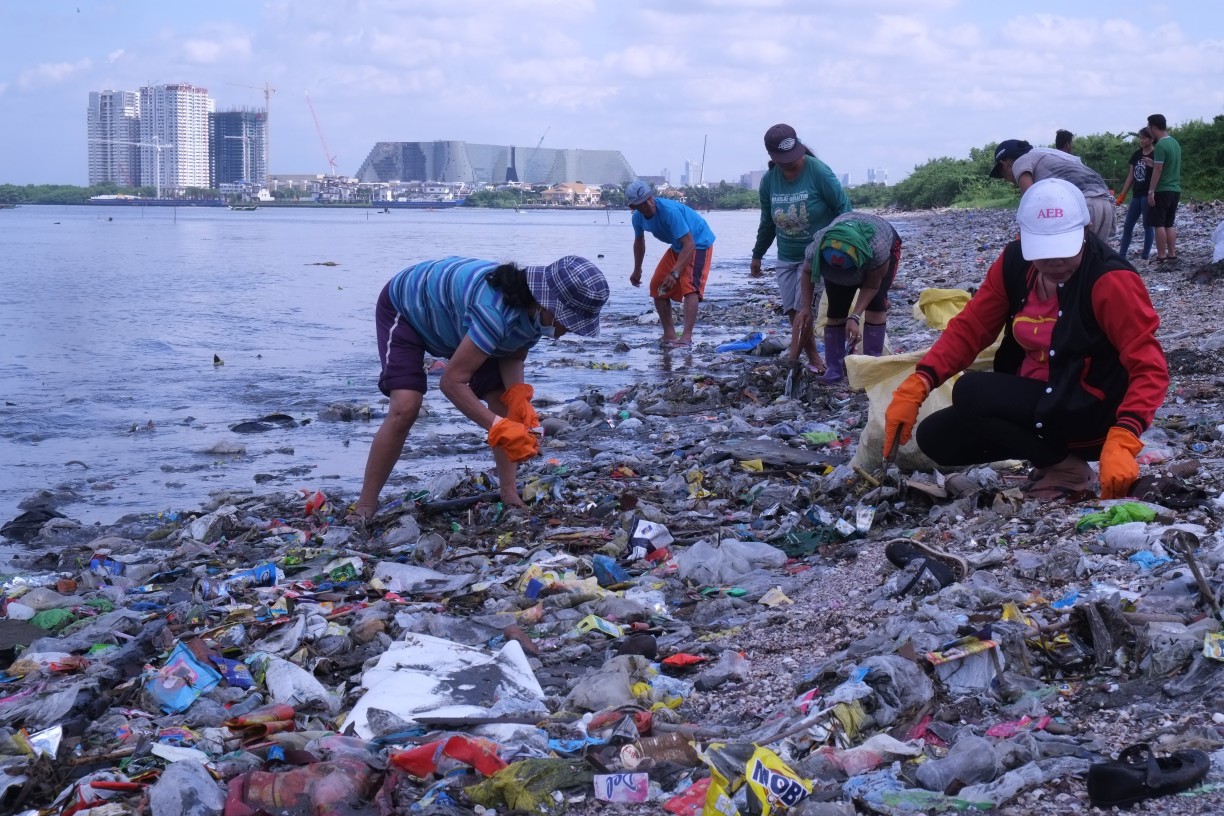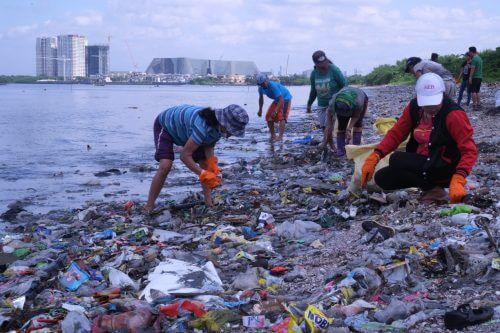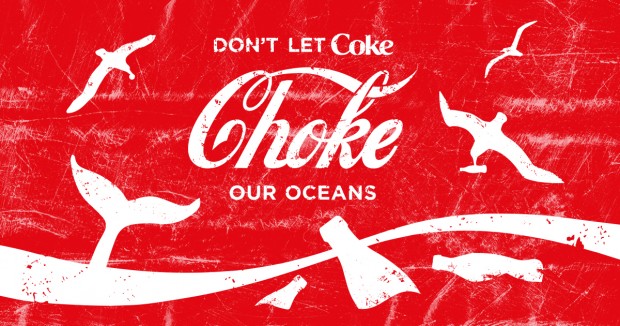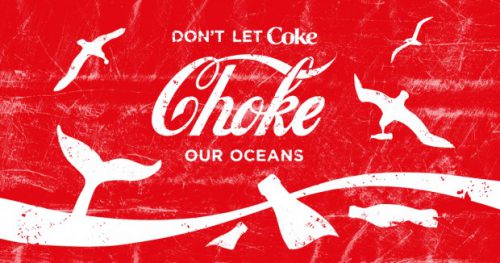The global plastic waste survey reveals: the biggest polluter of plastic waste in the sea is the "Coca Cola" company, followed by "Pepsi" and "Nestle" in the pollution index. What are they doing to stop the severe damage to the environment and health?
The war on plastic waste escalated last week, In a precedent decision of the European Parliament prohibit the sale of Disposable cutlery and plates, Disposable drinking straws, Ear cleaning sticksוCups for hot drinks. This drastic measure, which will be gradually implemented in European countries, is the result of growing public awareness of the problem of plastic waste in the sea and on beaches - a problem that, if not addressed soon, will mean that by 2050, the weight of plastic waste in the sea will be greater than the weight of fish.
in movement Break Free From Plastic - an international coalition of organizations to reduce plastic waste - gave a serious impetus to this move. The movement recently initiated a large global operation to clean beaches, where volunteers collected the waste and sorted it. This time, the purpose of the operation was not only the cleaning of the beaches, but also an attempt to understand which companies are responsible for most of the pollution - by flooding the market with non-degradable plastic products. The three main charges As found in the survey, they are Coca-Cola, Pepsi and Nestlé - followed by a series of other giant corporations, which will now no longer be able to escape responsibility for the waste they produce.
The Coke Wars
The huge operation took place this year on two dates: on June 5, the day on which the International Environment Day is celebrated, and on September 15, the World Cleanup Day. as part of the survey Volunteers cleaned 239 beaches in 42 different countries and sorted the collected plastic waste according to recognizable brands.
And the results: Of the nearly 200 plastic items collected, about 30 items could be associated with well-known brands. The list of the ten biggest polluters included only companies whose items were found in 10 different countries. In first place, by a considerable margin, stands the Coca-Cola company, with almost 10,000 items; Coca Cola items, hold tight, Found in 40 of the 42 countries that were sampled.
In second and third place are the companies Pepsi and Nestlé. In total, the three companies that are placed in the first places are responsible for 18 thousand of the 30 thousand branded items. After them, by a considerable margin, are, among others, Danone, Procter & Gamble, Unilever and Mars.


One hundred percent of packaging is recycled within five years
Plastic has become in recent decades for a serious blow For the oceans and the animals in them, and indirectly it is starting to be quite a problem for us as well. The short use of plastic utensils does not reflect its lifespan - the various types of plastic take up to many hundreds of years to decompose, and when we get rid of it, it may disappear from view, but it eventually returns, and in a big way. Estimates today speak of About 12 million tons of plastics that reach the oceans every year.
When the plastic remains intact, it clearly pollutes the sea and beaches. But the same plastic also breaks down into tiny pieces, the machines Microplastics. Marine animals that feed on plankton of a similar size are often mistaken for their food. In this way, it may cause them great harm and sometimes even cause their death, and in this way it also penetrates the fabric of the food, and may eventually end up on our plate inside the food from the sea that we eat. A new study recently found that tiny plastic particles are so common, they may even be found in the bodies of flying insects.
The concentrated cleaning carried out on the beaches illustrates not only the amounts of plastic we use, but also the responsibility of huge companies for much of this waste. Coca-Cola is one of the largest and most successful food retailers in the world (and the largest producer of soft drinks among them), and since many of its products are marketed in plastic bottles, which are often thrown away after a single use, it is not surprising to find them in large numbers on beaches around the world.
This is not the first criticism leveled at Coca-Cola for the environmental pollution it causes. Global Greenpeace, for example, manages Campaign against the amount of garbage that the company produces - according to them, in 2016 alone, the company produced 110 billion plastic bottles, that is, 3,400 bottles per second. But the company does not remain indifferent to a lot of criticism, and at the beginning of the year it announced that until 2030 the company plans to annually recycle an amount of plastic packaging and cans Compare to the one she produces, and to increase by then the amount of recycled plastic in each new bottle to 50 percent. In addition, the people of Coca-Cola intend to increase their use of bio-plastics - that is, plastic from natural sources, which is produced from plants and therefore has the potential to be completely biodegradable. in the company They declared In 2015, by 2020, up to 30 percent of their new bottles will be based on plant-based plastics.
Pepsi and Nestlé also announce efforts to reduce the amount of trash they produce: Nestlé announced last April that it intends to become 100 percent of its packaging to build-recycle or those that are suitable for reuse by 2025, and its vision is that in the end, not one of its packaging will end its life as waste in landfills or at sea. Also at Pepsi Define the year 2025 as a target, and they strive to reach this year when 100 percent of their packaging is recyclable or biodegradable.


Consumers are also responsible
And what about Israel? We also do it every year Surveys to examine the amount of plastic on the beaches. The person who edits them is Galia Pasternak, a doctoral student at the School of Marine Sciences at the University of Haifa and an expert on marine pollution, who is doing this as part of her doctoral thesis. Pastrank does not have data on the amount of waste by company, and she explains that in Israel the amount of plastic bottles found on the beaches is relatively small, and the one that is found mainly includes bottles that are XNUMX liters in size - probably due to the deposit law that applies to small beverage bottles, and encourages their recycling. What you can find to satiety on the beaches are cigarette butts, disposable cups, plastic bags, food packaging, corks and straws.
According to Pasternak's data from the latest waste survey conducted about two weeks ago (beginning of October), the main "stars" on the beaches were cigarette butts (24 percent - a dramatic increase last summer), disposable cups (12 percent), bottle caps and plastic bags (which one of which constitutes 11 percent of all waste), followed by snack wrappers, fast food packaging and other disposable utensils (9 percent) and followed by hard (7 percent).
According to Pasternak, the companies cannot be solely blamed for the amount of waste they produce, but it is a triple responsibility: the companies', the government's, and of course ours - the public, which consumes these products in quantities without which there would be no justification for their production. According to her, each of these three factors has something to do to reduce the amount of garbage that reaches the beaches: "Companies should reduce the single-use plastic that is used for packaging, by different means: for example, providing the possibility to fill in positions that will be distributed in networks, or packaging that can be reused , or simply not to put three layers of plastic, as is often the case", she suggests. "Governments, at the same time, can require the companies to be responsible for collecting and recycling their products (similar to the deposit law - which according to the results on our coast is working great, and the packaging law that has been in effect for the past two years), or ban the use of unnecessary disposable plastic products. And we, the consumers, can reduce our use of single-use plastic products, and of course when we already buy, we should reuse the product, and if not - make sure to dispose of it properly.'
More of the topic in Hayadan:

10 תגובות
When will you realize that the problem is the amount of people in the world?
Birth laws need 2 children per couple.
Uri S.
The warming is not a matter of opinion. She is real, and she is probably worse than expected or thought.
This is a "suppose" mental exercise. We are in a real emergency, and we need to do everything to help.
And - nuclear reactors is a possible solution. But solar energy also has a place, especially due to the fact that there is too much of it, at our fault.
Uri S.
I think you are right about many things.
But - first of all, we need to be honest (I'm not talking about you). The science is simple and proven: the combustion of fossil fuel causes the absorption of energy in the atmosphere. The result is more extreme weather, the melting of glaciers which causes the sea level to rise, rising temperatures that affect the flora and fauna in a dangerous way, a proliferation of diseases and so on.
These are things that are happening today - not dark predictions about a distant future. Moreover, new studies show that the models until now have been too optimistic.
The last time there was such climate change was 65 million years ago. Think about it.
4 comments for comments
1. Dummy solutions that cost a lot sometimes cause a lot of damage by not doing it. The problems are not really reduced, but there is an image and a false consciousness that there are indeed paths and ways of solution. The green blog on this topic is an eye opener.
2. My super assumption that it is not possible to reduce the use of plastic or reduce the consumption of fossil energy. Why? Because of the incentive system which is a great force (no less than fiscal) in shaping human behavior. India and China together have about 3 billion people and are in a sharp transition from agricultural societies to industrial societies. Africa will join them sooner or later. None of these giant companies will rightfully give up on adopting a western lifestyle. That is, cheap and continuous available energy and cheap products (packaged or made of plastic) I do not see any power in the world, neither hypocritical climate conferences nor failed vice presidents such as Al Gore, who are able to prevent this tremendous process. And if these are Trump's considerations for withdrawing from the climate agreements, he is not stupid at all.
3. There is no dispute about environmental pollution. There is no dispute about the mass extinction. There is no dispute about the horrific pollution of the oceans. There will be a great deal about the rate of warming, and about the quality of the existing models. It should be remembered that the science of specialization cannot be tested by normal ampere means. There are no two Earths in which one has the use of fossil energy and the other does not and can be compared between them. There are models and assumptions. And the earth was already warming before the era of the industrial revolution.
4. And let's assume that the scientific consensus is indeed right about warming. Will trade agreements for carbon dioxide emissions, as the climate conferences tried to do, be of any use?? Does anyone really believe this? Do you really think that reducing car emissions in Europe or the United States will reduce the use of fossil fuels in the world? Can using the funny solar energy bend the laws of physics? And serve as a real substitute for fossil fuel? Really?? Until now the discourse at the climate conferences and the public discourse on these issues is a false discourse. By the way, there is completely clean energy that has proven itself to be reliable, cheap and efficient - I am of course talking about nuclear reactors.
Uri S.
The green blog claims that it is not proven that there is a danger in warming. It's just a lie. Much damage has already been done, and many people have died.
There is a consensus in the scientific community. I don't care if someone tries such a solution as well. Not sure if it can be used for plastic because of the toxins, but definitely organic garbage. Plastic has two solutions: recycling and reducing production in the first place, and of course it's easiest to wait until there will be an ideal solution, but a less than ideal solution is better than doing nothing
Dear Avi Blizovsky!
Do nothing ? In the article I attached in the commentary, there are realistic methods of action, such as burning plastic trash, as opposed to beautiful solutions that will contribute nothing and a half. By the way, the green blog is not "mine", or "ours". I am a curious reader with varied interests. I have collected intellectual sources of information on the net that are of a higher standard than the written yellow press. One of them is the science website. you can be proud I have elitist taste. At the same time, I repeat and say doing for the sake of doing does not contribute anything. Action should be effective and speak to reality. The analogy that comes to my mind right now for the "doing" you are preaching about, is the massive investment of funds in the desire to eradicate the cancer devised by the Nixon administration. This investment is brilliantly compared by Siddhartha Mukherjee in his Pulitzer Prize-winning book "The Queen of All Diseases" to investing money in sending a spacecraft to the moon when Newton's laws were not yet known.
Dear Avi Blizovsky!
Do nothing ? In the article I attached in the commentary, there are realistic methods of action, such as burning plastic trash, as opposed to beautiful solutions that will contribute nothing and a half. By the way, the green blog is not "mine", or "ours". I am a curious reader with varied interests. I have collected intellectual sources of information on the net that are of a higher standard than the written yellow press. One of them is the science website. you can be proud I have elitist taste. At the same time, I repeat and say doing for the sake of doing does not contribute anything. Action should be effective and speak to reality. The analogy that comes to my mind right now for the "doing" you are preaching about is the massive investment of funds in the desire to eradicate the cancer devised by the Nixon administration. This investment is brilliantly compared by Siddhartha Mukherjee in his Pulitzer Prize-winning book "The Queen of All Diseases" to investing money in sending a spacecraft to the moon when Newton's laws were not yet known.
Well done, your "green" blog only knows how to do one thing - explain why not do anything. Although usually those who do not do are not wrong either, but in the current case, not doing and going back as is happening in the Trump era, hastens the disaster.
Once again the site shows good proficiency in data analysis but 0 proficiency and understanding of human behavior and the system of incentives that motivates people. If the policy measures proposed in the article are implemented I assure everyone that the oceans will continue to be irreversibly polluted. Just as I predicted in a comment a few years ago on this site regarding the stupid climate conferences and their methods of operation (the emissions into the atmosphere of course continue to increase on a global level and not because of the Koch brothers..)
:
And here is an article on the subject by the excellent blogger The Green Blog
http://www.green-logic.info/2018/08/